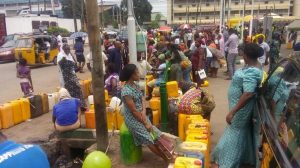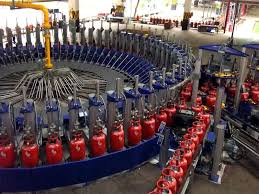By Solomon Asowata and By Folasade Akpan
The Nigerian Association of Liquefied Petroleum Gas Marketers (NALPGAM), says the removal of Value Added Tax (VAT) on cooking gas by the Federal Government will deepen market penetration, boost the country’s economy and protect the environment.
Mr Nosa Ogieva-Okunbor, President , NALPGAM, stated this during the association’s Governing Council Meeting held in Lagos on Tuesday.

He noted that the removal of VAT on the gas supply to marketers by Nigerian Liquefied Natural Gas (NLNG) would attract more investors and reduce importation of gas into the country.
“This removal of VAT on Liquefied Petroleum Gas (LPG), popularly known as cooking gas, has crashed the price of cooking gas by about 30 per cent in the market.
“Currently, a 12.5kg bottle of gas which was N4,300 now sells for between N2,500 and N2,700 and has also deepened household usage of gas,’’ he said.
Ogieva-Okunbor said the association would take effective steps to deepen the use of LPG and increase local consumption from the current 700,000 metric tonnes to 1,000,000 metric tonnes annually.
He said that the target can increase to about five million metric tonnes by 2025 if stakeholders in the sector adhere to standards.
“If achieved, Nigeria will join the league of nations with high level of LPG consumption,” he said.
The President also stressed the need for the reduction of import duty on LPG equipment so as to encourage more investors to come in and deepen LPG consumption in the country.
He, however, expressed concern over growing indiscriminate establishment of gas plants in filling stations, which he said pose a great danger to the citizenry and the economy.
Ogieva-Okunbor said that the association is not against establishments of such plants but insisted that they must operate with the same Standard Operating Procedure (SOP) applicable to standard gas plants as laid down by the Department of Petroleum Resources (DPR).
He noted that the right procedure for petrol filling stations to dispense cooking gas was for them to retail already filled gas cylinders.
Ogieva-Okunbor added that the DPR had given a directive for the removal of gas plants in filling stations by December 2020.
In a related development, the average price per litre paid by consumers for National Household Kerosene increased to N319.94 in August 2019 from N316.03 in July, according to the National Bureau of Statistics (NBS).
 Kerosene queue.
Kerosene queue.
The bureau, in its “National Household Kerosene Price Watch (August 2019)” obtained from its website on Tuesday in Abuja, said the increase is by 1.24 percent month-on-month and 10.80 percent year-on-year.
The report by the bureau indicates that states with the highest average price per litre of kerosene were Abia, N375.55; Enugu, N365.47; and Ebonyi, N358.33.
It also said that states with the lowest average price per litre of kerosene were Abuja, where it sold for N245.50; Kwara, N261.11; and Benue, N261.90.
“Similarly, average price per gallon paid by consumers for kerosene increased by 0.19 percent month-on-month and by 11.92 percent year-on-year to N1, 213.53 in August 2019 from N1, 211.18 in July.
“States with the highest average price per gallon of kerosene were Gombe, N1, 400; Adamawa, N1, 360.00; and Borno, N1, 355.
“States with the lowest average price per gallon of kerosene were Bayelsa, N1, 030; Akwa Ibom, N1, 079.58; and Osun,N1, 085.22.”
The NBS said that in arriving at the statistics, field work was carried out by its staff in all states of the federation, supported by supervisors who were monitored by internal and external observers. (NAN)




GIPHY App Key not set. Please check settings